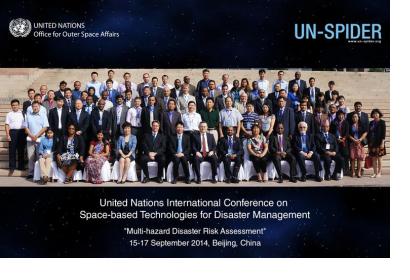The United Nations International Conference on Space-based Technologies on for Disaster Management - "Multi-hazard Disaster Risk Assessment" took place from 15 to 17 September 2014 in Beijing, China. This Conference was co-organized by the UN-SPIDER Beijing Office of UNOOSA and the Ministry of Civil Affairs of the People’s Republic of China (PRC), in collaboration with the Department of Treaty and Law, Ministry of Foreign Affairs of PRC, the Department of Social Security, the Ministry of Finance of PRC, the Department of System Engineering, China National Space Administration of PRC, the Asia Pacific Space Cooperation Organization (APSCO) and with the support of DigitalGlobe.
More than 110 participants from 36 countries representing 56 organizations attended the event. The conference agenda offered six plenary sessions, three working group sessions and one scientific symposium consisting of about 50 presentations. On the last day, the conference invited participants to visit two centres of excellence in Beijing (Earth Observation and Data Center of China National Space Administration and National Disaster Reduction Centre of China).
The plenary sessions covered the following themes:
- Disaster risk management and space-based information;
- Approach and methodology in using space based information in multi-hazard identification and risk assessment;
- Space-based information resources for hazard identification and risk assessment;
- Space-based information for damage and loss estimation;
- National experiences; and
- Networking and engagement with UN-SPIDER network.
In addition, three working groups on the following topics took place:
- Engagement with UN-SPIDER;
- Symposium on drought monitoring; and
- Mapping services and products for emergency response.
A symposium on “Advances in using space technology and geospatial information for disaster management” took place on the last day of the conference on the premises of the National Disaster Reduction Centre of China.
The conference brought together participants from countries which have received Technical Advisory Support (TAS) from the UN-SPIDER in the past as well as from countries that are willing to work with UN-SPIDER.
In addition to sharing knowledge, exchanging ideas, and developing networks, the conference also served as a platform to plan UN-SPIDER activities including Technical Advisory Missions, capacity building programmes and outreach events.
A conference booklet including the complete agenda and abstracts is available online. All conference presentations are available on the conference web page.
Read more about the inauguration of the conference in an article by the Ministry of Environmental Protection of the People's Republic of China.

